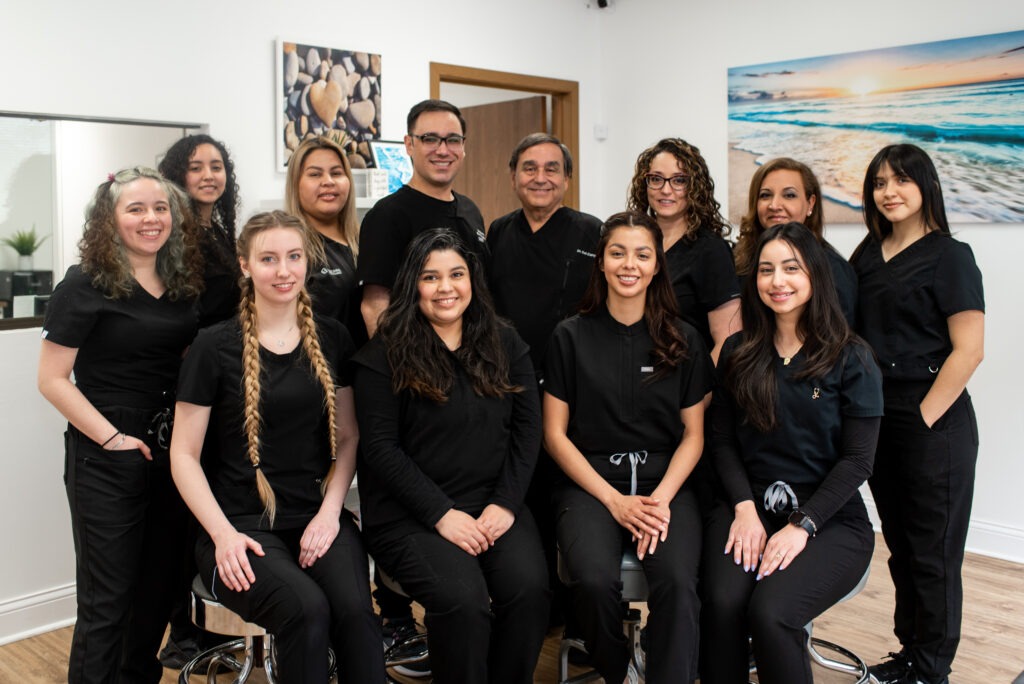Skin cancer, often lurking in the background of our busy lives, is a health concern that deserves our full attention. It’s not just a statistic; it’s one of the most prevalent forms of cancer and affects millions globally. At the Chicago Skin Clinic, we understand the gravity of this issue and are here to shed light on it, helping you navigate the complexities of skin cancer with ease and understanding. Today, we’ll briefly discuss common types of skin cancer, who is at risk for skin cancer, and when you should have a skin cancer screening so you can protect yourself.
Skin Cancer 101
Skin cancer manifests in three primary forms, each with distinct characteristics. Basal cell carcinoma (BCC), the most common yet least dangerous type, typically appears as a translucent bump on sun-exposed skin areas and rarely spreads beyond its original site. Squamous cell carcinoma (SCC) presents as a red, scaly patch or a fast-growing lump and is more aggressive than BCC, potentially spreading if untreated. The most serious form, melanoma, can rapidly spread to other body parts and often develops from an existing mole that changes in appearance. Early detection is vital for effective treatment of all types, but we’ll get to that soon!
Who Is At Risk Of Skin Cancer?
Cancer is not picky about where it manifests, but some factors make it more likely.
- Genetic Predisposition: A family history of skin cancer greatly increases individual risk. Those with this background should be particularly vigilant about skincare and regular screenings.
- Sun Exposure: Prolonged and unprotected exposure to the sun’s ultraviolet (UV) rays is a major risk factor. This includes intentional sunbathing, incidental exposure during everyday activities, and artificial exposure in tanning beds.
- Skin Type: Individuals with fair skin, light hair, and light eyes prone to sunburn are at a higher risk. It’s important to note that people with darker skin are also susceptible to skin cancer, though it’s often not diagnosed until later.
- History of Sunburns: Experiencing severe sunburns, particularly in childhood, can elevate the risk of developing skin cancer in later life. Even just one bad sunburn in youth can double the risk of skin cancer!
So, When Should You Have A Skin Cancer Screening?
Generally, regular skin cancer screenings should start at the age of 30, especially for those with known risk factors. However, if you have a family history of skin cancer, fair skin, or a history of frequent sunburns or tanning bed use, starting earlier is advisable. Individuals with a large number of moles or those who have noticed changes in existing moles should also consider earlier and more frequent screenings.
For people with darker skin tones, who may have a lower risk but are not immune to skin cancer, screenings are still important. In these cases, skin cancer can often go unnoticed and potentially be more advanced when diagnosed. Therefore, regular check-ups are crucial for early detection.
Our dermatologists, Dr. Danny or Dr. Del Campo, stress that skin cancer screenings are as important as regular dental or physical exams. By starting and maintaining skin cancer screenings regularly, you significantly increase your chances of catching skin cancer early, when it is most treatable.

What Is A Skin Cancer Screening?
Anything can be a little scary when you don’t know what’s going to happen, especially with the word “cancer” involved. Here’s a rundown of what you can expect at your skin cancer screening(s) to hopefully calm your nerves and encourage your first appointment.
Pre-Screening Consultation:
- The screening begins with discussing your medical history, family history of skin cancer, and any specific concerns you might have.
- Our dermatologists will ask about changes you’ve noticed in your skin, including new growths, changes in moles, or other areas of worry.
Full-Body Skin Examination:
- Our team will provide you with a gown for privacy. Dr. Danny or Dr. Del Campo will then conduct a head-to-toe examination of your skin.
- We’ll give special attention to areas often exposed to the sun, like the face, arms, and legs, as well as less visible areas, like the scalp, between toes, and the soles of the feet.
Mole and Lesion Evaluation:
- Your dermatologist will examine moles, birthmarks, and any other lesions using a dermatoscope, a tool that provides a magnified view of the skin.
- They will look for the ABCDEs of melanoma: Asymmetry, Border irregularity, Color variation, Diameter larger than a pencil eraser, and Evolving size, shape, or color.
Discussion and Recommendations:
- After the examination, your dermatologist will discuss their findings with you. If they find any suspicious areas, they may advise a biopsy, a procedure where a small skin sample is taken for further analysis.
- You will receive personalized advice on how to monitor your skin based on their findings and get recommendations for follow-up appointments.
Education on Self-Examination:
- Even if we find nothing that warrants further testing, our team will teach you how to perform regular self-examinations at home. You’ll learn what signs to look for and when to seek medical advice.
Post-Screening Follow-Up:
- If a biopsy is performed, we’ll inform you of the results as soon as they are available and any necessary next steps.

Get Peace Of Mind And Quality Care At Chicago Skin Clinic!
Taking charge of your skin health is vital for a healthier, more assured life. Skin cancer screenings are more than just a precaution; they’re an investment in your future well-being. Don’t wait for a sign or symptom. Be proactive and schedule your first skin cancer screening with Chicago Skin Clinic in Chicago today. It’s a simple yet powerful action that can make all the difference. You deserve to live a long, healthy life, and we’re here to help deliver just that.
 SCHEDULE NOW
SCHEDULE NOW
